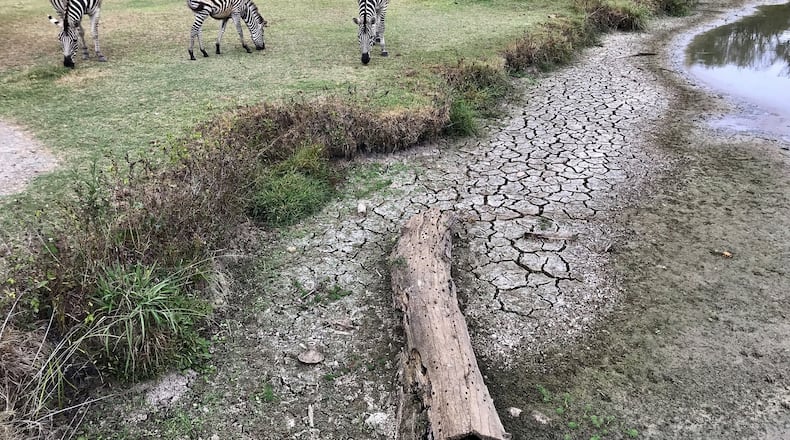More fires in North Georgia and hard soil in the farming South are signs of a lingering dry spell and a recent heat wave that could harm farmers and forests.
Several metro Atlanta counties are in "extreme drought," according to a new state report, which could someday mean inconvenience for residents if saturating rains don't fall soon. Last week, Coweta County on the metro area's south side imposed watering restrictions, following the city of Griffin farther south.
There are no statewide watering restrictions yet. Reservoir levels are dropping, but they aren’t dangerously low.
“We’re not anywhere near where we were in 2007 and (2008) when they were talking about Atlanta running out of water,” said Pam Knox, an agricultural climatologist with the University of Georgia.
Even so, she said some livestock owners have already used up their winter hay supplies because the fields have been too dry to grow forage.
Farmers, still recovering from the high winds of Hurricane Michael last year, are worrying, especially those who rely on rainfall rather than irrigation, said Brian Cresswell, a UGA agricultural extension agent in Early County in southwest Georgia.
“They can’t plow up a lot of these peanuts because the ground’s too hard,” he said. Even those with irrigation will take a financial hit, since it costs money to power the pumps.
If it rains before the harvest season ends in late October, the damage will be limited, he added.
>> RELATED: Tax relief extended for Georgia farmers impacted by drought
Meanwhile, forestry officials are bracing for a repeat of fall 2016, when fires consumed swaths of mountain forests. Some rain gauges have been dry for 60 days, and now dead leaves and pine needles are dropping as metro Atlantans head north to enjoy the fall scenery — and to start campfires.
“Not only is it super dry, but we’ve got a lot of fresh fuel all over the forest floor,” said Seth Hawkins, of the Georgia Forestry Commission.
The southern United States is gripped in a “flash drought” brought on by record-setting heat whose immediate cause is a high-pressure system that has dried the skies.
Nearly 56 million residents are in drought conditions in 16 states, according to the latest U.S. Drought Monitor report, out Thursday. The drought is classified as extreme in parts of Georgia and several nearby states.
The Georgia Environmental Protection Division is reporting 10 counties in extreme drought, including Fulton, Clayton, Fayette, Cherokee, Forsyth and Coweta. South metro Atlanta has had a quarter to half the normal rainfall the past three months.
Fulton officials say they’re monitoring the situation, and encouraged people to be “mindful” of their water use. State law prohibits landscape watering from 10 a.m. to 4 p.m., to minimize evaporative loss.
Soil moisture levels are low, particularly in northeast Georgia.
Steven Bekkerus, a spokesman for the National Forest Service, said there are no campfire restrictions yet, but rangers are concerned.
"We are seeing those levels approach or exceed what we saw in 2016," he said. Blazes that year torched tens of thousands of acres and sent smoke toward Atlanta, burning into December.
The number of fires this September was four times more than normal, with 2,766 acres burned as of Friday. They’ve been small and easily contained, typically at a quarter acre.
However, this year could be more dangerous than 2016 because the drought is spread around the state rather than focused in the north.
“Our resources could get stretched thin if fires start popping up around the state,” said Hawkins, the Georgia forestry official.
He is focused on prevention, with a team that has been warning about the dangers at trailheads, schools and fall festivals. The top cause of forest fires is windblown burning debris, so they’re telling campers to stir water into their campfires until they are cool enough to touch.
Relief may be on the way.
Channel 2 Action News meteorologist Brian Monahan said rain is forecast for next week, starting Sunday. It’ll take a lot to catch up, though. There have been fewer than 33 inches of rainfall so far this year. The normal number is around 40 inches, he said.
Monahan attributed the drought to a high-pressure system squatting over the South.
The record-setting heat that has dried the air and soil also plays a role, said Kim Cobb, a climate scientist at Georgia Tech. There were heat waves across the planet, she said, “and we know what’s causing that warming: It’s greenhouse gases.”
Knox, the UGA climatologist, said the poles of the planet are warming, and this is flattening the temperature gradient between them and the equatorial region. That could be changing the airflow patterns up in the atmosphere. People are already seeing unusual temperatures.
Besides the heat wave last month, Georgia saw record highs in May. In Denver, the mercury plummeted from 83 degrees on Wednesday afternoon to 13 degrees on Thursday night, which The Denver Post reported as among the biggest swings in the city's history. It was a record-breaking temperature followed by another record low early Friday: 9 degrees.
“We probably will see more frequent floods and more frequent droughts because of the amplification of the atmospheric weather patterns by warmer conditions,” Knox said.
That’s bad news for forests and farmers and not just because of fire and hard earth. Weakened trees and warmer temperatures invite bugs, like tree-eating beetles. Virus-bearing white flies have been infecting vegetable plants, and armyworms have been eating pastures.
On the bright side, the mud-free ground makes it easier to move tractors, and the harvest is ahead of schedule, Knox said.
“Conditions are very nice for harvesting — as long as you’ve got a crop to harvest.”
For updates on the drought and this weekend’s forecast, rely on Channel 2 Action News at WSB-TV.
About the Author
The Latest
Featured



